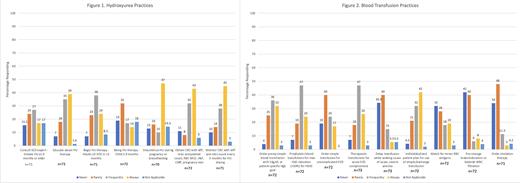Introduction
Of 300,000 children born with sickle cell disease (SCD) in the world, approximately 75% of these are born in Sub-Saharan Africa. Owing to the frequent painful vaso-occlusive and hemolytic episodes associated with this disease, irreversible multi-organ damage and premature mortality are common. For instance, in Nigeria, 490 deaths per 1000 births among children under 5 have been attributed to SCD; this is four times higher compared to mortality in children born without SCD. On the other hand, those with SCD who survive beyond childhood are faced with an estimated life expectancy of 21 years. To address these challenges, guidelines for SCD management were developed by the Nigerian Federal Health Ministry, National Heart, Lung, and Blood Institute (NHLBI), and the American Society of Hematology but their dissemination and implementation has been difficult. To better understand current management practices, we present a preliminary, descriptive analysis of hydroxyurea and blood transfusion practices for sickle cell disease management across Nigeria.
Methods
Using a cross-sectional design, we collected demographic and practice-related information from eligible clinicians that provide SCD care in Nigeria. The “SCD Knowledge, Attitudes, and Practices - Nigeria” survey was disseminated to pediatric and adult consultant physicians, resident doctors, and nurses through their respective professional communication platforms. SCD-related practices questions were based on the NHLBI recommendations for SCD management which informed the Nigerian Federal Ministry's National SCD Guideline. A 5-point Likert scale was used to answer each question on hydroxyurea use and blood transfusion. Descriptive analyses of current practices were used to characterize these results and bivariate analyses were conducted using Chi-square or Fisher's test as appropriate. Data analysis was performed using SAS 9.4 (SAS Institute; Cary, NC). Ethical approval was obtained from Duke University Institutional Review Board and the University of Nigeria, College of Medicine Health Research Ethics Committee.
Results
Analysis of SCD-related practices from the first 73 participants who have completed the survey, revealed most respondents to be female (62%), between 35-65 years old (77%), and adult hematologists or nurses (37% and 40% respectively). This group of clinicians provide care mainly to adults (47%), but 45% admitted providing care to both adults and children. Nearly half (45%) of this group provides care for 0-5 individuals with SCD weekly and 57 participants (78%) work in tertiary-level hospitals. Only 22 of those working in tertiary hospitals had a comprehensive SCD center in their hospital compared to those without an SCD center (39% vs. 61%, p=0.0148). SCD experts were also found in tertiary-level hospitals (75% vs. 25%, p<0.0001). General hematologist expertise was also common in tertiary care (88% vs. 12%, p=0.2424). Figures 1 and 2 report HU and blood transfusion practices. Although 73% confirmed hydroxyurea (HU) prescribing and 90% endorsed the use of simple blood transfusions, HU and blood transfusion practices varied greatly. Respondents indicated most educated patients about HU (frequently/always = 74%) and started HU for patients with >3 VOCs in past year (frequently/always = 62%), however, only 31% frequently/always begin at age 9 months (Figure 1). Most respondents reported prophylactic blood transfusions to reduce HbS below 30% (frequently/always = 71%) and 73% frequently/always performed transfusions for acute SCD complications, yet, 60% indicated they never/rarely match for RBC antigens.
Conclusion
The data highlights SCD-related expertise and specialty care are found more in tertiary-level hospitals. HU practices described may be attributed to the more conservative approach suggested by the Nigerian SCD Management Guideline compared to the NHLBI recommendations, however there is an important opportunity to expand HU prescribing. Blood transfusion, which has historically been considered difficult in this differently resourced setting, was common. However, chelation, leukoreduction/white blood cell filtration, and red blood cell antigen testing were not common. These preliminary findings represent an opportunity for a larger study and future studies to investigate strategies to increase uptake of existing SCD management recommendations.
Disclosures
Ibemere:bluebird bio: Honoraria, Other: Member Insights Council. Shah:Agios: Consultancy, Current equity holder in private company, Current equity holder in publicly-traded company, Current holder of stock options in a privately-held company, Divested equity in a private or publicly-traded company in the past 24 months; Forma: Consultancy, Current equity holder in private company, Current equity holder in publicly-traded company, Current holder of stock options in a privately-held company, Divested equity in a private or publicly-traded company in the past 24 months; Vertex: Consultancy, Current equity holder in private company, Current equity holder in publicly-traded company, Current holder of stock options in a privately-held company, Divested equity in a private or publicly-traded company in the past 24 months; Bluebeard Bio: Consultancy, Current equity holder in private company, Current equity holder in publicly-traded company, Current holder of stock options in a privately-held company, Divested equity in a private or publicly-traded company in the past 24 months; Emmaus: Consultancy, Current equity holder in private company, Current equity holder in publicly-traded company, Current holder of stock options in a privately-held company, Divested equity in a private or publicly-traded company in the past 24 months, Membership on an entity's Board of Directors or advisory committees, Other, Speakers Bureau; Bausch Health: Consultancy, Current equity holder in private company, Current equity holder in publicly-traded company, Current holder of stock options in a privately-held company, Divested equity in a private or publicly-traded company in the past 24 months; Pfizer: Consultancy, Current equity holder in private company, Current equity holder in publicly-traded company, Current holder of stock options in a privately-held company, Divested equity in a private or publicly-traded company in the past 24 months, Honoraria, Membership on an entity's Board of Directors or advisory committees, Other, Patents & Royalties, Research Funding, Speakers Bureau; Alexion: Membership on an entity's Board of Directors or advisory committees, Other, Speakers Bureau.


This feature is available to Subscribers Only
Sign In or Create an Account Close Modal